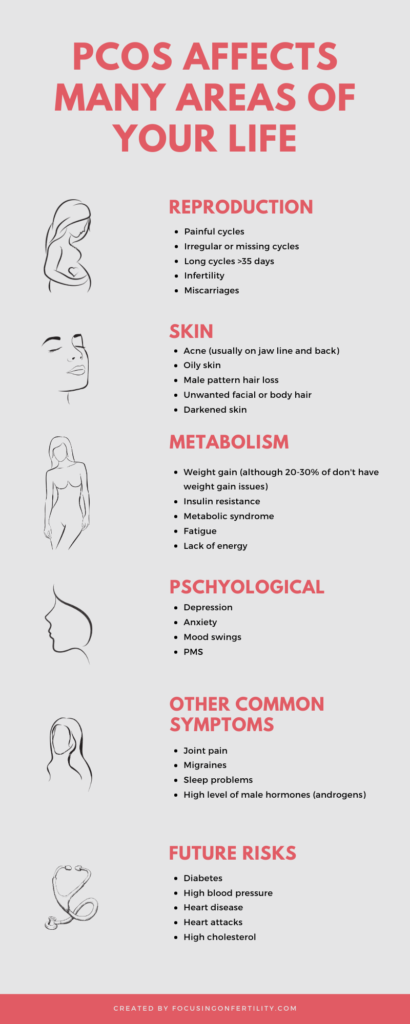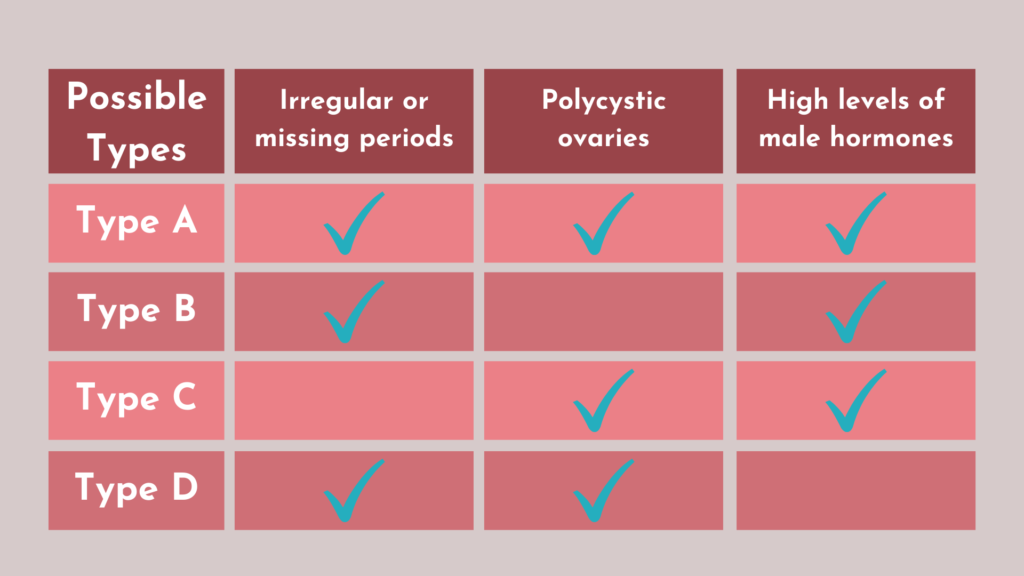What is Polycystic Ovarian Syndrome (PCOS)?
A woman is diagnosed with PCOS when she has some or all of a set of symptoms (a syndrome).
By the way, PCOS is also a diagnosis of exclusion. This means that doctors must rule out other causes for your hormonal problems before they can diagnose you with PCOS.
Polycystic ovary syndrome (PCOS) is a health problem that affects 1 in 10 women of childbearing age. Women with PCOS have a hormonal imbalance and metabolism problems that may affect their overall health and appearance. PCOS is also a common and treatable cause of infertility.
Department of Health & Human Services – Office of Women’s Health
PCOS is not a disease, it means you are having metabolism (insulin resistance/blood sugar problems) and hormonal problems (sex hormones). Two women can be diagnosed with PCOS but have very different symptoms and very different factors driving their PCOS.
Taking the PCOS Self Assessment will give you a much better understanding of what PCOS means for you and your health.
Diagnosing PCOS
Most doctors use the Rotterdam Criteria for diagnosing PCOS[1]
You must have two of these three characteristics:
1. Irregular or absent periods
- Some women may only have a few periods a year or may not even be having periods.
- Other women may be having regular periods but they are 35 days or more apart.
2. High levels of male hormones (androgens)
- This may cause some women to have excess hair growth, male pattern hair loss, and/or acne.
- In other women, these high male hormones may only show up in a blood test.
3. Polycystic ovaries on an ultrasound: for a diagnosis of PCOS, they are looking for the following:
- Twelve or more follicles in a single ovary or 26 in both ovaries (for women between ages 18-35)
- An ovary that is larger than 10 cm
Symptoms of PCOS

Types of PCOS
Since PCOS is a syndrome, or a set of symptoms, our understanding of the symptoms and the types of PCOS is continuing to evolve as new research is done.
If you search online, you will find some doctors say there are 4 types of PCOS, others say there are 5 or even 6 types.
We use the types listed by the National Institutes of Health (NIH).

SURPRISINGLY, KNOWING WHICH TYPE YOU ARE DOES NOT REALLY HELP DETERMINE HOW TO TREAT IT!
Why is this? There are no set protocols for treatment based on the type! Typing just helps to group which symptoms you may be having. Your symptoms will help to identify the metabolic and hormonal problems you are experiencing and then improvements will come from addressing your specific imbalances.
It is better by far for you to take a PCOS Self Assessment to really nail down your PCOS symptoms. This will tell us which factors are affecting your metabolism & hormones so that we (you and one of us together) can address them.
PCOS and Infertility
About 70-80% of women with PCOS will struggle with infertility[2].
So, while PCOS is common and often leads to problems getting pregnant, it responds well with an improved diet, added nutrients, and lifestyle changes, all of which address your specific hormonal and metabolic imbalances.
As a matter of fact, diet and lifestyle is the first line of treatment recommended by the American Society of Reproductive Medicine.[3]
Lifelong impact of PCOS
Having PCOS increases your risk for several other health conditions[4]. Even if you don’t have a lot of PCOS symptoms, or you are not trying to get pregnant, you still should investigate the causes of your PCOS and address them.
If you have PCOS you are at a higher risk for:
- Insulin Resistance – which can eventually lead to Diabetes
- Metabolic Syndrome – a set of symptoms or conditions including: high blood pressure, high blood sugar, excess body fat around the waist, and abnormal cholesterol)
- Obesity
- Heart Disease
- High Blood Pressure
- Sleep Apnea – increases your risk for obesity, diabetes, heart attack, and high blood pressure
- Mood Disorders – like depression and anxiety
- Inflammation – which is a risk factor for heart attacks and strokes
Why Natural Approaches are the Best Way to Treat PCOS
Diet and lifestyle are the first line of treatment recommended by the American Society of Reproductive Medicine.[3]
There is plenty of research showing that PCOS is affected by diet, stress, sleep, nutrition, exercise, and environmental exposures to toxins[5],[6],[7]. PCOS also affects your mental state, your skin, your heart, and your immune system[4]. It is really an all-encompassing syndrome. Throwing a drug or two may help with symptoms but it does not address the lifetime of impact from the metabolic and hormonal imbalances. If you want more info click here >> Why Lifestyle and Diet Approaches are Better than Medical “Band Aids” for PCOS
Our goal is to help our clients with PCOS to address all of these things! We know how they are all connected. When a couple of spokes of the wheel are missing the wheel doesn’t turn.
We are looking at metabolic and hormonal disruptions that affect the entire body.
Most medical doctors prescribe drugs like birth control pills to regulate your cycles or to reduce period pain. They also prescribe Metformin for blood sugar balance, sometimes without even checking insulin levels. (They sometimes only check glucose levels.) They may even prescribe Clomid to induce ovulation.
These drugs just address the results of the symptoms. The metabolic and hormonal issues are still there. They may be hidden for a time, but they are still there. The stressors that triggered these imbalances are still there too.
We have a whole blog dedicated to why natural approaches are best for PCOS. Check it out here >> Why Lifestyle and Diet Approaches are Better than Medical “Band Aids” for PCOS
What Kind of Natural Approaches for PCOS Do We Recommend?
The foundation of your health always starts with diet and lifestyle.
We recommend diet upgrades, lifestyle improvements, and nutrition supplements that have research showing they help to rebalance hormones and replenish minerals.
Since every woman’s PCOS is triggered by different factors, each woman’s recommendations are going to be personalized to her.
We have a whole blog dedicated to how we work with PCOS. Check it out here >> Why Lifestyle and Diet Approaches are Better than Medical “Band Aids” for PCOS
Are you ready to get started?
FIRST, TAKE THE PCOS SELF ASSESSMENT
Taking the self assessment will help you determine what factors are affecting your metabolism and hormones.
If you would like an in depth look at your unique situation with a Functional Nutritional Therapy Practitioner, make sure to set up a Discovery Call and we can work together to determine how to proceed.
Were you looking for Part 1 and Part 3 of this blog series?
Why Lifestyle and Diet Approaches are Better than Medical “Band Aids” for PCOS
How we work with you to turn your PCOS around and optimize your fertility
NEXT, BOOK A DISCOVERY CALL!
We can help YOU figure out what path is BEST for you!
References
[1]The Rotterdam criteria for polycystic ovary syndrome: evidence-based criteria?; Rui Wang, Ben Willem J. Mol; Human Reproduction, Volume 32, Issue 2, 1 February 2017, Pages 261-264.
[2] Treatment of infertility in women with polycystic ovary syndrome: approach to clinical practice; Anderson Sanches Melo, Rui Alberto Ferriani, and Paula Andrea Navarro; Clinics (Sao Paulo). 2015 Nov; 70(11): 765–769.
[3] Recommendations from the international evidence-based guideline for the assessment and management of polycystic ovary syndrome; Helena J Teede, Marie L Misso, Michael F Costello, Anuja Dokras, Joop Laven, Lisa Moran, Terhi Piltonen, Robert J Norman, International PCOS Network; Fertil. Steril. 2018 Aug.
[4] National Institute of Health and Human Services, About Poly Cystic Ovarian Syndrome.
[5] Diet and Lifestyle in the Prevention of Ovulatory Disorder Infertility; Jorge E. Chavarro, MD, ScD, Janet W. Rich-Edwards, MPH, ScD, Bernard A. Rosner, PhD, and Walter C. Willett, MD, DrPH; Obstet Gynecol. 2007 Nov.
[6] Lifestyle and environmental contributions to ovulatory dysfunction in women of polycystic ovary syndrome Bingqian Zhang, Wei Zhou, Yuhua Shi, Jun Zhang, Linlin Cui, and Zi-Jiang Chen; BMC Endocr Disord. 2020 Jan 30.
[7] The Effect of Low Carbohydrate Diet on Polycystic Ovary Syndrome: A Meta-Analysis of Randomized Controlled Trials; Xiaoshuai Zhang, Yang Zheng, Yanan Guo, and Zhiwen Lai; Int J Endocrinol. 2019 Nov 26.